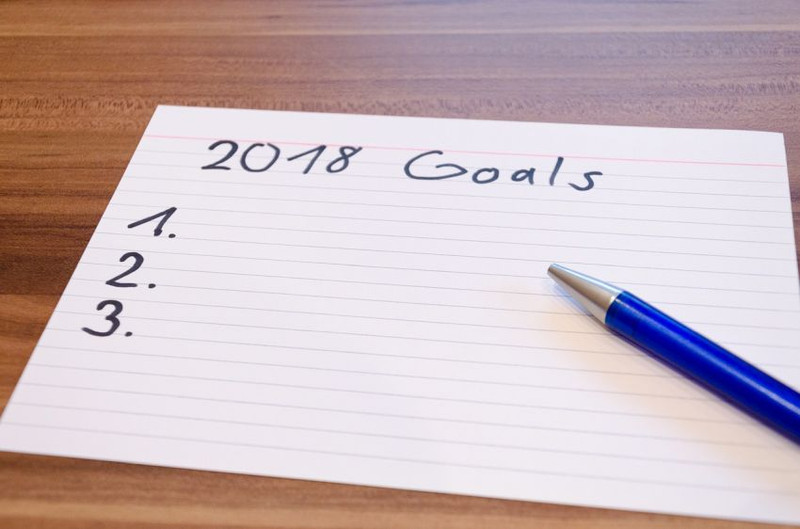So, you're sick and tired of making New Year's resolutions year after year, only to break them long before January gives way to February? Or, maybe you're just sick and tired, period, and in need of some easy-to-reach pick-me-ups that will leave you feeling fit, strong, and healthy for 2018.
Here are eight resolution suggestions to grab onto and make a go of once you finish ringing in the New Year. Best wishes for a happy and healthy 2018!
Get a complete physical exam.
Oh, you already get one each year? Good for you. Keep it up. But many people avoid going to the doctor unless they absolutely must. Granted, going to the doctor's office, let alone a clinic or hospital, is no fun, but it's good to know where you stand healthwise, starting with all your numbers (blood pressure, glucose, cholesterol, etc.) and to get on a prescribed regimen if needed. Give yourself a chance to live a longer and healthier life.
Make protein and fiber focal points of your daily diet plan.
Mixing and matching vitamins, minerals, nutrients, supplements to perform certain specified health tasks on behalf of our bodies can be overwhelming. There are, literally, thousands of possible combinations and dosages of these dietary components to fit our particular bodily needs. However, starting out with a focus on foods and vitamins, etc. high in
fiber and
protein can cut through a lot of the clutter. Fiber, a plant-derived carbohydrate, enhances the movement of material through our digestive system, prevents or relieves constipation, helps us maintain a healthy weight and can even lower the risk of diabetes and heart disease. Protein, composed mainly of enzymes, is one of our body's primary building blocks for muscle, blood, skin, hair, nails (fingers and toes) and internal organs. Eat up.
Set a weight-loss goal and get there.
Get some specific guidance from your physician or a licensed nutritionist to devise an eating and exercise plan that will help you lose weight in a healthy manner. No shortcuts using magical pills or formulas. Put together an eating plan that goes back to the basics – the foundation being a nice assortment of fruits and vegetables – to include salads – as well as lean meats. Avoid second helpings, and eat plenty of fiber and protein, and skip at least one dessert a day. Combine that with a realistic and fun exercise program, preferably some cardio, such as walking, jogging, biking, or swimming – aiming for at least 150 total minutes a week.
Drink eight 12-ounce glasses of water daily.
Seven days a week. Maybe this equates to two fill-ups of your big water bottle. Whatever suits you. If you consider this a chore, you are batting .000 in the game of life. Water is the elixir of life. It will keep you hydrated and help get you through the rough spots, such as dealing with stress or getting beyond that mild heartburn you experience after a lunch with spicy food. Note, too, per the mention of fiber earlier, fiber works most efficiently when you drink lots of water to go with it.
Eat three meals a day, with a healthy snack between.
In other words, don't skip meals; by doing so, your body goes into fat-storing starvation mode, as Dr. Oz puts it. Keep your engine (metabolism) operating at full efficiency. Between the three meals, make it a well-rounded regimen of fruits, veggies, lean meats, and skimp on the sweets and fried foods. An apple or a banana, along with some low-fat yogurt, make for healthy snacks and help kill the between-meals cravings,
Sleep 8 hours a night, at least shoot for 7.
No more, no less, but if you have sleep issues (anxiety,
sleep apnea, etc.), see your doctor and get it checked out. Maybe a sleep study program is in order. Studies have shown that sleep deprivation, even if just a moderate amount, can play havoc with hunger – you know, it makes you eat more. Keep a chart of hours slept to hold yourself accountable and to foster discipline as it relates to time management, which is a good thing – a very good thing.
Start a new hobby that involves exercise or exertion.
Golf? That's not bad, if you walk and don't ride a cart all the time. Yes, it's great for cardio (if you're walking) and getting/staying limber, but it can really eat up the day and take you away from the family (usually). Another suggestion: gardening. It's calming, relaxing, and a terrific workout that yields works of beauty (flowers) or health (vegetables), for instance. I like gardening because it's purposeful, says Jeff Restuccio, a first-degree black belt and author of
Fitness the Dynamic Gardening Way, quoted at
webmd.com. Exercise 30 to 60 minutes, then quit, whether everything is planted or not.
Make it a point to take care of your bones.
As we age, bone health takes on added urgency. Once we hit 30, our bodies quit manufacturing additional bone deposits, and from that point on we stand to start losing bone mass. Chronic loss of bone can result in reduced bone mineral density as well as the deterioration of bone tissue, and now we are looking at osteoporosis. Fractures from osteoporosis occur more often than heart attack, stroke, and breast cancer combined. Keep plenty of
calcium,
vitamin D, and protein – among other supplements – around.

